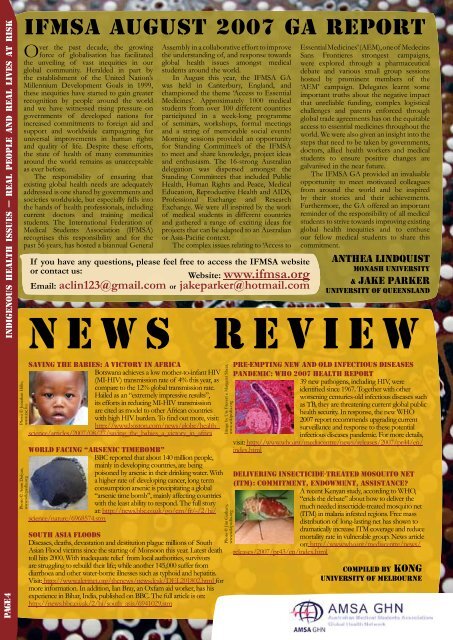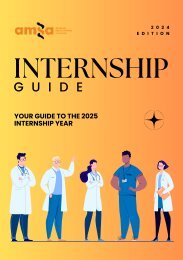Vector Issue 5 - 2007
You also want an ePaper? Increase the reach of your titles
YUMPU automatically turns print PDFs into web optimized ePapers that Google loves.
indigenous health issues — real people and real lives at risk<br />
ifmsa august <strong>2007</strong> ga report<br />
Over the past decade, the growing<br />
force of globalisation has facilitated<br />
the unveiling of vast inequities in our<br />
global community. Heralded in part by<br />
the establishment of the United Nation’s<br />
Millennium Development Goals in 1999,<br />
these inequities have started to gain greater<br />
recognition by people around the world<br />
and we have witnessed rising pressure on<br />
governments of developed nations for<br />
increased commitments to foreign aid and<br />
support and worldwide campaigning for<br />
universal improvements in human rights<br />
and quality of life. Despite these efforts,<br />
the state of health of many communities<br />
around the world remains as unacceptable<br />
as ever before.<br />
The responsibility of ensuring that<br />
existing global health needs are adequately<br />
addressed is one shared by governments and<br />
societies worldwide, but especially falls into<br />
the hands of health professionals, including<br />
current doctors and training medical<br />
students. The International Federation of<br />
Medical Students Association (IFMSA)<br />
recognises this responsibility and for the<br />
past 56 years, has hosted a biannual General<br />
Assembly in a collaborative effort to improve<br />
the understanding of, and response towards<br />
global health issues amongst medical<br />
students around the world.<br />
In August this year, the IFMSA GA<br />
was held in Canterbury, England, and<br />
championed the theme ‘Access to Essential<br />
Medicines’. Approximately 1000 medical<br />
students from over 100 different countries<br />
participated in a week-long programme<br />
of seminars, workshops, formal meetings<br />
and a string of memorable social events!<br />
Morning sessions provided an opportunity<br />
for Standing Committee’s of the IFMSA<br />
to meet and share knowledge, project ideas<br />
and enthusiasm. The 16-strong Australian<br />
delegation was dispersed amongst the<br />
Standing Committees that included Public<br />
Health, Human Rights and Peace, Medical<br />
Education, Reproductive Health and AIDS,<br />
Professional Exchange and Research<br />
Exchange. We were all inspired by the work<br />
of medical students in different countries<br />
and gathered a range of exciting ideas for<br />
projects that can be adapted to an Australian<br />
or Asia-Pacific context.<br />
The complex issues relating to ‘Access to<br />
If you have any questions, please feel free to access the IFMSA website<br />
or contact us:<br />
Website: www.ifmsa.org<br />
Email: aclin123@gmail.com or jakeparker@hotmail.com<br />
Essential Medicines’ (AEM), one of Medecins<br />
Sans Frontieres strongest campaigns,<br />
were explored through a pharmaceutical<br />
debate and various small group sessions<br />
hosted by prominent members of the<br />
‘AEM’ campaign. Delegates learnt some<br />
important truths about the negative impact<br />
that unreliable funding, complex logistical<br />
challenges and patents enforced through<br />
global trade agreements has on the equitable<br />
access to essential medicines throughout the<br />
world. We were also given an insight into the<br />
steps that need to be taken by governments,<br />
doctors, allied health workers and medical<br />
students to ensure positive changes are<br />
galvanised in the near future.<br />
The IFMSA GA provided an invaluable<br />
opportunity to meet motivated colleagues<br />
from around the world and be inspired<br />
by their stories and their achievements.<br />
Furthermore, the GA offered an important<br />
reminder of the responsibility of all medical<br />
students to strive towards improving existing<br />
global health inequities and to enthuse<br />
our fellow medical students to share this<br />
commitment.<br />
anthea lindquist<br />
monash university<br />
& jake parker<br />
university of queensland<br />
n e w s r e v i e w<br />
page 4<br />
Photo © Jonathan Hillis,<br />
www.sxc.hu<br />
Photo © Aram Dulyan,<br />
www.wikipedia.org<br />
saving the babies: a victory in africa<br />
Botswana achieves a low mother-to-infant HIV<br />
(MI-HIV) transmission rate of 4% this year, as<br />
compare to the 12% global transmission rate.<br />
Hailed as an “extremely impressive results”,<br />
its efforts in reducing MI-HIV transmission<br />
are cited as model to other African countries<br />
with high HIV burden. To find out more, visit:<br />
http://www.boston.com/news/globe/health_<br />
science/articles/<strong>2007</strong>/08/27/saving_the_babies_a_victory_in_africa<br />
world facing “arsenic timebomb”<br />
BBC reported that about 140 million people,<br />
mainly in developing countries, are being<br />
poisoned by arsenic in their drinking water. With<br />
a higher rate of developing cancer, long term<br />
consumption arsenic is precipitating a global<br />
“arsenic time bomb”, mainly affecting countries<br />
with the least ability to respond. The full story<br />
at: http://news.bbc.co.uk/go/em/fr/-/2/hi/<br />
science/nature/6968574.stm<br />
south asia floods<br />
Diseases, deaths, devastation and destitution plague millions of South<br />
Asian Flood victims since the starting of Monsoon this year. Latest death<br />
toll hits 2000. With inadequate relief from local authorities, survivors<br />
are struggling to rebuild their life; while another 145,000 suffer from<br />
diarrhoea and other water-borne illnesses such as typhoid and hepatitis.<br />
Visit: http://www.alertnet.org/thenews/newsdesk/DEL201802.html for<br />
more information. In addition, Ian Bray, an Oxfam aid worker, has his<br />
experience in Bihar, India, published on BBC. The full article is on:<br />
http://news.bbc.co.uk/2/hi/south_asia/6941029.stm<br />
Image by Ute Frevert & Margaret Shear,<br />
www.wikipedia.org<br />
Photo © Jim Gathany,<br />
www.wikipedia.org<br />
pre-empting new and old infectious diseases<br />
pandemic: who <strong>2007</strong> health report<br />
39 new pathogens, including HIV, were<br />
identified since 1967. Together with other<br />
worsening centuries-old infectious diseases such<br />
as TB, they are threatening current global public<br />
health security. In response, the new WHO<br />
<strong>2007</strong> report recommends upgrading current<br />
surveillance and response to these potential<br />
infectious diseases pandemic. For more details,<br />
visit: http://www.who.int/mediacentre/news/releases/<strong>2007</strong>/pr44/en/<br />
index.html<br />
delivering insecticide-treated mosquito net<br />
(itm): commitment, endowment, assistance?<br />
A recent Kenyan study, according to WHO,<br />
“ends the debate” about how to deliver the<br />
much needed insecticide-treated mosquito net<br />
(ITM) in malaria infested regions. Free mass<br />
distribution of long-lasting net has shown to<br />
dramatically increase ITM coverage and reduce<br />
mortality rate in vulnerable group. News article<br />
on: http://www.who.int/mediacentre/news/<br />
releases/<strong>2007</strong>/pr43/en/index.html<br />
compiled by kong<br />
university of melbourne
















